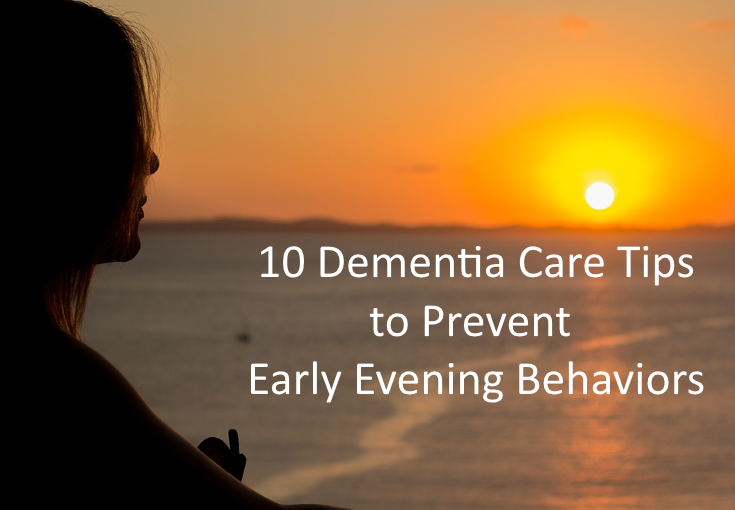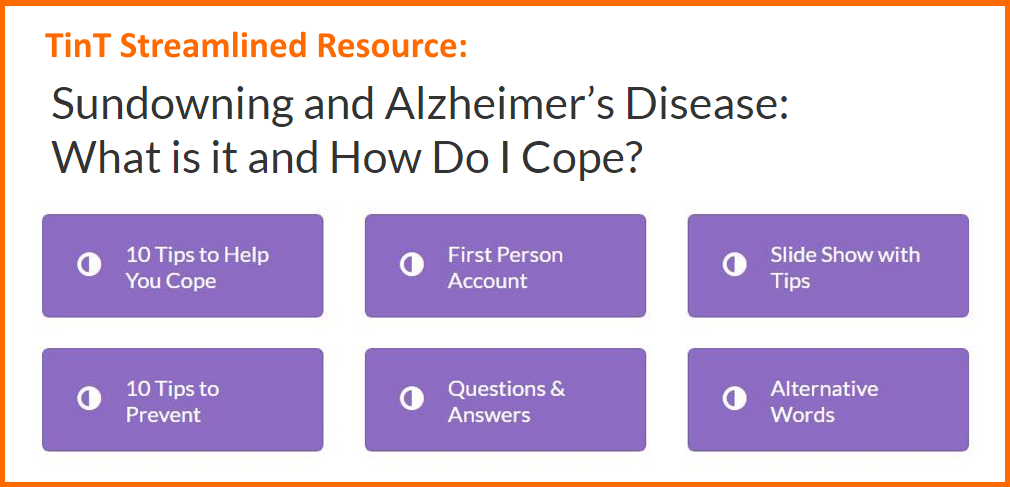
Editor’s Note: The term “Sundowning” is sometimes used as a negative label which can be damaging to the care provided, and results in unjust stereotyping. This contributes to approaches to care that focus on weakness rather than strength, illness rather than wellness, and victims rather than whole persons. It’s important, as the author states, to look at any behaviors as a form of communication. This will help you discover, and hopefully, address the trigger that is negatively affecting your loved one. Learn More.
Contributing Writer: Christy Turner, founder of Dementia Sherpa
You’re a dementia care partner. You’ve just been through a “sundowning” episode. You’re exhausted, and so is your person living with dementia. You’d do virtually anything to never go through that again.
You may be looking for a quick, easy fix – who doesn’t love a quick, easy fix?! But this is one area where putting in some time and effort up front is going to pay huge dividends down the road.
1. Start by noting what time it started. Going forward, make sure your person is involved in a structured activity about 30 minutes before that.
Need ideas? Together In This has already curated games and activities that fit the bill for you. Just choose what looks good and then move on to #2 below.
2. Routine is the name of the game. Structure and routine are your best friends. Yes, it’s good to be flexible and roll with the unexpected, but that’s for you.
For your loved one, keep it very predictable. This significantly reduces anxiety.
3. Use lavender or geranium essential oils. Keep them in a diffuser in the bedroom and living room, spritz some on a shirt collar, and also look for complementary bath products.
4. Eliminate boredom. These behaviors are communication, albeit communication expressed in a way you don’t like.
By this point in the disease process, this type of communication feels necessary to people living with dementia;
It’s possible they can’t be left to their own devices to figure out what to do, because they may no longer be able to hold on to a thought long enough to carry it through to a meaningful action.
They need you to provide visual cues and coach them through it.
5. Help them burn energy throughout the day. Don’t let a surplus build up, waiting to erupt.
Bonus: Active people sleep better at night (and have few problems with constipation, which can be another root cause of “sundowning,” in the sense that your person is trying to tell you there’s a problem!).
On the other hand, don’t run someone ragged, either. Extreme exhaustion and over-stimulation lead straight back to “sundowning.”
6. Keep all the lights on until it’s time to start the bedtime routine. Again, visual cues are much easier for people living with dementia to understand.
7. Recognize reality. Dementia isn’t a cure for waking up on the wrong side of the bed any more than it’s a cure for feeling emotions. Sometimes, people just have a bad day. It happens.
8. Routine physical affection helps generate positive feelings throughout the day. For both of you. 🙂
9. Offer plenty of reassurance throughout the day. You know you’ve said “I love you” or “I’ll protect you” or “You’re safe with me” ten times by noon…but your person likely doesn’t remember.
Repeat loving reassurances often. Pro tip: Every time you’re about to blurt out, “Remember?” in frustration, turn it into “I love you!” instead.
10. Remember to HALT! Feeling Hungry, Angry, Lonely, or Tired can lead to undesirable “behavior” in everyone.
Anticipate and attend to those needs throughout the day. Pro tip: More than one of those needs can exist at the same time, so check for each every couple of hours throughout the day.
11. HUGE BONUS TIP: “Sundowning” is really, truly just another word for communication. Re-read the first 10 tips to prevent “sundowning,” but this time, substitute the phrase “communication I don’t enjoy” every time you see “sundowning” or “behavior.”
For even more insight on what it’s like for a person living with dementia trying to communicate with you, check out Christy’s article:
What It’s Like When No One Believes You
And be sure to grab your complimentary copy of Communication Tips for Dementia Care Partners mentioned below!
 About the Author: Christy Turner is the founder of Dementia Sherpa. She’s helped over 1100 through the rough terrain that is dementia.
About the Author: Christy Turner is the founder of Dementia Sherpa. She’s helped over 1100 through the rough terrain that is dementia.
Be sure to visit her site, and learn more about her and her great resources at DementiaSherpa.com.
Click here for her complimentary guide, Communication Tips & Strategies for Dementia Care Partners.
If you like what you’ve read, why not receive periodic updates when you:
Subscribe to the TinT Newsletter
Have you experienced early evening changes in behavior with your loved one? Please share your experience or questions in the comments below:






Thanks Christy for another great article. I’m sure boredom is often behind aspects of Maureen’s behaviour that I struggle with . Rosemary sprigs are already strategically positioned around the house and lavendar will be in shortly: both are in profusion in our garden. One other aroma I think helps is orange so I never throw the peel on my compost heap until it has done its stint in the lounge. I’m so glad I tracked you down the more guides I have on this journey the better!
Thanks, Paul 🙂 Did you know citrus stimulates appetite?
I think it’s tough to be the “cruise director” 24/7–sometimes a care partner such as yourself just needs a break. True story: I helped a client’s care partner get signed on for in-home respite service. When the care partner left the house that first time, he drove around the block, parked under a shade tree, and stared off into space for a couple hours. He needed that down time!
PS-I’m trying to revive my mini rosemary bush…any tips?
Maureen has been the Head Hardener for herbs. She planted them as small plants and they are now large bushes. I will send photos later. I’m currently trying to persuade her to come out of the car after a lovely walk on the beach. She is adamant we don’t live here. Hope I resolve this before that full moon comes our way!
This and many other reads assume carers live in! It is harder still being 35 minutes travel away with just 10 minute drop ins 3 x from outside agencies. Not sure what to make of Sundowning. Only understand how it all is actually . The tearful calls, the not knowing how to channel hop, how to entertain themselves when you are not present. Social care is a big topic and without funds to help us carers.
Yes, this particular post does assume that by the time disease progression has advanced to this point, a person living with dementia would have in place the 24/7 supervision and care required. (At this point, the mental age is typically equivalent to a 4-6 year-old.)
No matter where someone is in the disease progression, resources can feel difficult to come by, as you point out. I’m not sure where you live, but there are resources for 4 countries in the bottom third of this post: dementiasherpa.com/just-ask